Microsoft Edge joins ChatGPT: doesn't want to be a Chrome downloader
Have you heard of "Chrome Downloader"? This is the nickname people give to Microsoft's browser. Whether it is the ancient Internet Explorer (IE) or the later Edge, for them, Google Chrome seems to be a lingering shadow.
The simple, lightweight, and fast browsing experience made Chrome’s browsing experience surpass that of IE and Firefox. Extensions and app stores were also quite avant-garde concepts at the time, which greatly enhanced Chrome’s playability. The open source Chromium, coupled with the influence of Google search, has deeply affected many web developers and prioritized adapting to Chrome.
This has also given rise to the shortcut of browser development "based on Chromium". Opera, once known for its high performance, customizability, and multi-function, has long abandoned its Presto. In the face of market changes, Microsoft had to give up its own EdgeHTML typesetting engine. Edge changed its appearance and became the new "vest" of Chromium.
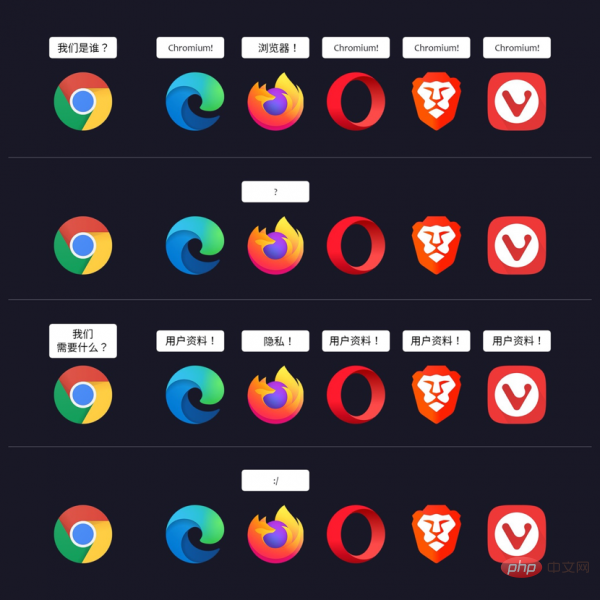
Changing to Chromium, although it has the inherent advantage of Windows’ pre-installed browser, Edge is still being crushed by Chrome. In the 2022 browser market share data released by StatCounter, although Microsoft Edge has surpassed Apple Safari to occupy the second place, Chrome's dominance remains unshakable.
Bing cannot defeat Google, and Edge cannot surpass Chrome. Microsoft has always wanted to be the first, but it has no chance.
Now, Microsoft’s opportunity has finally arrived.
When Microsoft invested in OpenAI in 2019, it may not have thought that it would become a winner. OpenAI's ChatGPT has been popular since the end of last year. Microsoft has not only made additional investments, but also cooperated with OpenAI to allow Bing and Edge to bring users a completely different experience from the past.
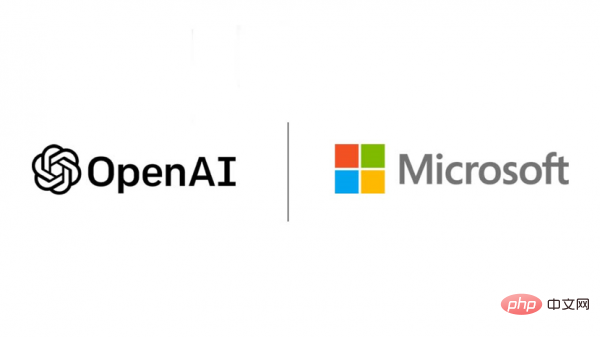
"Just from the changes in appearance, it is not difficult to see that Microsoft has high hopes for this cooperation." Tom Warren, senior editor of The Verge, also lamented this new version on Twitter The Edge browser looks beautiful.
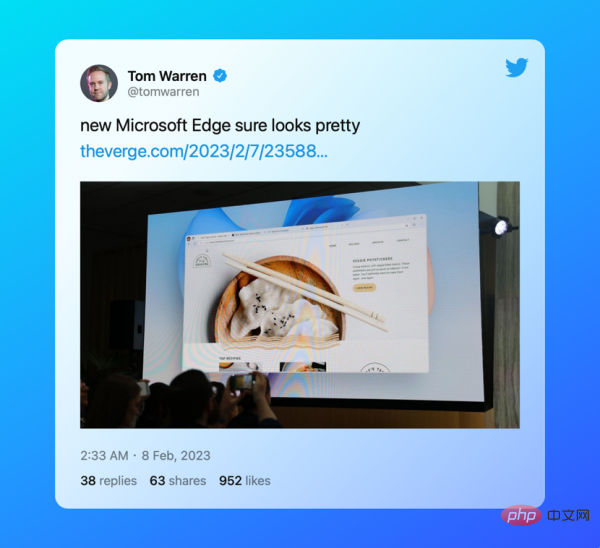
The Edge integrates the new Bing. The most obvious change is that the "Discover" that belongs to the sidebar is not only replaced by the Bing Chat icon, but its position is also improved. Go to the toolbar and become a commonly used function, which will not disappear when the sidebar is hidden.

This icon reminds me of Clippy, the paper clip assistant that Microsoft launched for Office in the early years. It’s just that the one on Edge looks more useless than the other one. The little things suggested are much more practical.
Since Microsoft has not yet opened up this new feature to users on a large scale, we can only wait and enjoy the demo. Whether it's extracting the essence from PDF files, helping to modify articles/emails, or helping you compare prices on shopping websites... Edge has transformed from a simple web browser into a powerful assistant for web browsing.
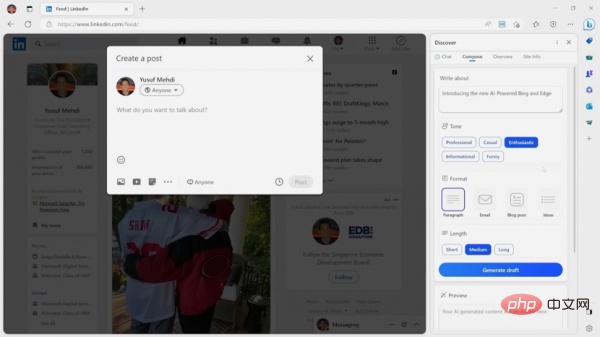
This can also be seen from the interactive experience of the new version of Edge. The appearance of the old version of Edge is almost the same as that of other "Chromium shell" browsers - nothing more than the tab bar, address/search box, toolbar, favorites, main window, sidebar...
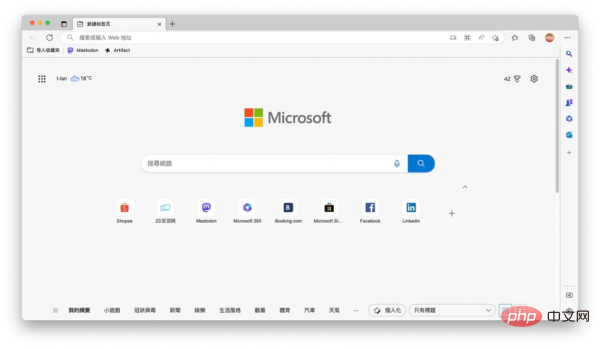
The old version of Microsoft Edge interface has obvious color differences between the main window and the tab bar
Although the new version of Edge has not made major adjustments to the location of specific functions, it has not reduced the borders as much as possible, reducing the The influence of browser elements on browsing web content even goes in the opposite direction. Instead, there is an extra border around the edge of the main window. But the new version of Edge overall looks more like a "container" used to "hold" web content. The main window becomes a rounded rectangular area, and the web content just "lies" inside.
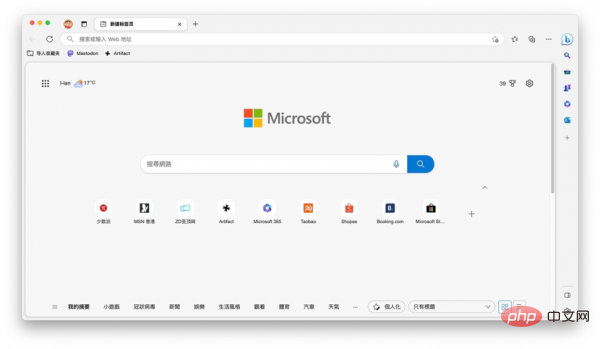
In the new version of Edge interface, the tab bar is integrated with other elements, and the main window border becomes a rounded rectangle
Click the options in the sidebar or the "Discover" button, not only the animation effect will be smoother, but the web page will also be smoother. The content and sidebar content are placed in two similar rounded rectangles, which are more like two "flat" areas and look more comfortable.
This rounded corner design with shadow, plus new animation effects, I wonder if it is "borrowed" from the previous small-scale popularity Arc Browser. But I have to say that the new version of Edge has indeed been greatly improved in appearance and functionality. In particular, the new "Explore" function, combined with the auxiliary browsing capabilities provided by artificial intelligence, can even dwarf browsers like Arc and Beam that can only make fuss about appearance and interaction. I don’t know if Microsoft thought about using ChatGPT technology to transform Edge like this when it invested in OpenAI.
There are currently many browsers developed based on Chromium. Just like Brave focuses on Web3 experience, Vivaldi focuses on multi-function, and Arc emphasizes new interaction methods, artificial intelligence will also make Edge stand out.
On the other hand, Google Chrome has become increasingly bloated and cumbersome, and has even been notorious as a "memory killer" for many years. Chrome also has privacy concerns due to its long-term lack of new ideas and the fact that Google has long abandoned its credo of "Don't be evil."
Chrome, which killed IE, has now become the new IE.
YouTube KOL "Linus Tech Tips" said: "The combination of Bing and ChatGPT makes me rethink everything."
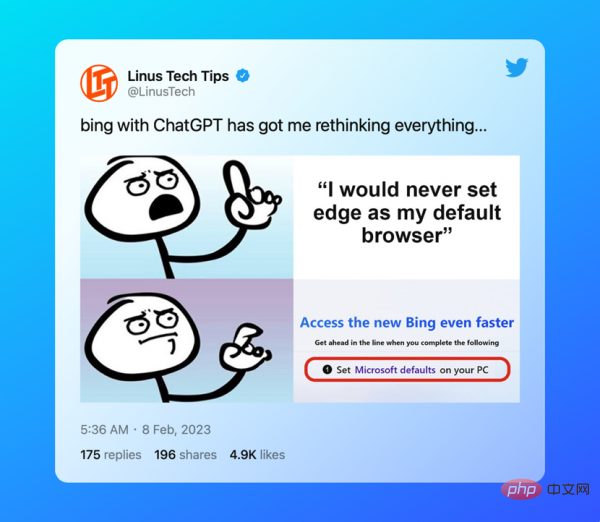
But this will be Microsoft Edge A good chance to get back into the game? not necessarily. First of all, Edge itself has a problem similar to Chrome's excessive memory usage, and the privacy terms of Microsoft products are not much "kinder" than Google's. Moreover, Edge frequently recommends its "Microsoft Computer Manager" to users, which affects the user experience. In addition, Google has also launched its own ChatGPT-like artificial intelligence product Bard, which may be integrated with its products in the future.
In short, the time left for Microsoft to turn around is quite limited, and it is really not that easy to bring down Chrome. This poll involving more than 40,000 Twitter users also reflects people’s views: The popularity of
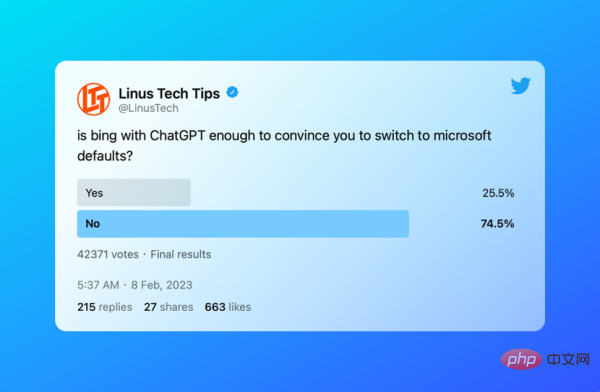
ChatGPT has made technology giants begin to pay attention to the development of artificial intelligence business. Judging from the demonstration effect, Edge has indeed changed the web browsing experience, and more similar browsers or browser extensions may appear in the future. In future website development, in addition to continuing to optimize traditional SEO, screen adaptation, and interactive experience, the user experience of artificial intelligence must also be taken into consideration.
For example, at least the content of the web page should be recognized by the artificial intelligence in the browser. In the future, there may be adaptations for pictures, audio and video, and it may even provide a good solution for the barrier-free design of the website. of assistance.
As an important entrance to the desktop Internet, after the battle between Microsoft, Mozilla, Google, and Opera ended, Google almost won. However, after that, the desktop browser field lacked new ideas for a long time. Even in recent years, manufacturers can only make a fuss about appearance and privacy protection at most, including Brave, Vivaldi, and even Opera. It is not difficult to see that they are products developed based on Chromium.
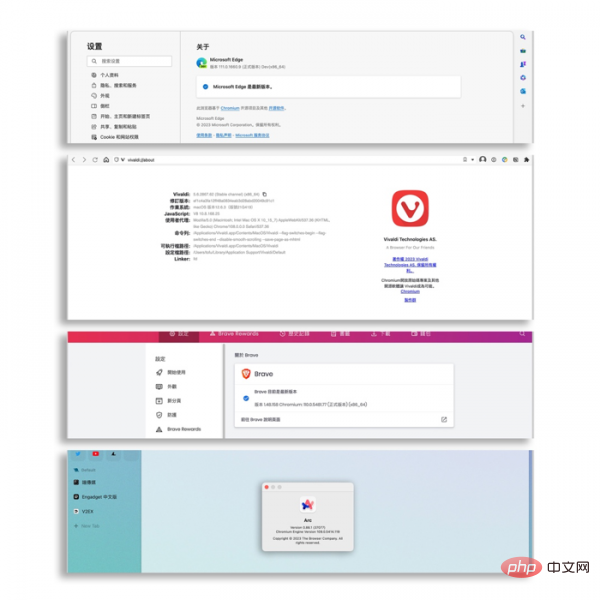
Regardless of browser or search engine, Google has every advantage. Even with ChatGPT, the new version of Bing may still not be able to shake Google’s dominant position in the search engine market. As for the combination of Edge and OpenAI, will Chrome's position be in jeopardy? I'm afraid that's not necessarily the case. As mentioned before, Edge still has similar problems to Chrome. Maybe these problems are solved and the browser can be "downsized". At least in terms of the basic web browsing experience, it can surpass Chrome by a large margin. .
However, if you want to "overthrow" Chrome, in addition to improving the browser experience and adapting to user habits, the market environment itself is also a big problem.
Different from the environment in the early years when browsers flourished, many people today rely heavily on Google services for their "Internet surfing" experience. Not only search, YouTube and Gmail are still among the best in similar services.
Although it also uses the Chromium and Blink engines, for Google products, Edge is not "its own" after all. Google will intentionally or unintentionally limit the product experience in other browsers, or cause pop-ups in the product. Reminder, guide users to download Chrome. These operations that affect the product experience will more or less affect people's willingness to change Chrome. As for this part, I'm afraid we can only wait for Google's "conscience discovery".
The above is the detailed content of Microsoft Edge joins ChatGPT: doesn't want to be a Chrome downloader. For more information, please follow other related articles on the PHP Chinese website!

Hot AI Tools

Undresser.AI Undress
AI-powered app for creating realistic nude photos

AI Clothes Remover
Online AI tool for removing clothes from photos.

Undress AI Tool
Undress images for free

Clothoff.io
AI clothes remover

Video Face Swap
Swap faces in any video effortlessly with our completely free AI face swap tool!

Hot Article

Hot Tools

Notepad++7.3.1
Easy-to-use and free code editor

SublimeText3 Chinese version
Chinese version, very easy to use

Zend Studio 13.0.1
Powerful PHP integrated development environment

Dreamweaver CS6
Visual web development tools

SublimeText3 Mac version
God-level code editing software (SublimeText3)

Hot Topics
 Bytedance Cutting launches SVIP super membership: 499 yuan for continuous annual subscription, providing a variety of AI functions
Jun 28, 2024 am 03:51 AM
Bytedance Cutting launches SVIP super membership: 499 yuan for continuous annual subscription, providing a variety of AI functions
Jun 28, 2024 am 03:51 AM
This site reported on June 27 that Jianying is a video editing software developed by FaceMeng Technology, a subsidiary of ByteDance. It relies on the Douyin platform and basically produces short video content for users of the platform. It is compatible with iOS, Android, and Windows. , MacOS and other operating systems. Jianying officially announced the upgrade of its membership system and launched a new SVIP, which includes a variety of AI black technologies, such as intelligent translation, intelligent highlighting, intelligent packaging, digital human synthesis, etc. In terms of price, the monthly fee for clipping SVIP is 79 yuan, the annual fee is 599 yuan (note on this site: equivalent to 49.9 yuan per month), the continuous monthly subscription is 59 yuan per month, and the continuous annual subscription is 499 yuan per year (equivalent to 41.6 yuan per month) . In addition, the cut official also stated that in order to improve the user experience, those who have subscribed to the original VIP
 Context-augmented AI coding assistant using Rag and Sem-Rag
Jun 10, 2024 am 11:08 AM
Context-augmented AI coding assistant using Rag and Sem-Rag
Jun 10, 2024 am 11:08 AM
Improve developer productivity, efficiency, and accuracy by incorporating retrieval-enhanced generation and semantic memory into AI coding assistants. Translated from EnhancingAICodingAssistantswithContextUsingRAGandSEM-RAG, author JanakiramMSV. While basic AI programming assistants are naturally helpful, they often fail to provide the most relevant and correct code suggestions because they rely on a general understanding of the software language and the most common patterns of writing software. The code generated by these coding assistants is suitable for solving the problems they are responsible for solving, but often does not conform to the coding standards, conventions and styles of the individual teams. This often results in suggestions that need to be modified or refined in order for the code to be accepted into the application
 Seven Cool GenAI & LLM Technical Interview Questions
Jun 07, 2024 am 10:06 AM
Seven Cool GenAI & LLM Technical Interview Questions
Jun 07, 2024 am 10:06 AM
To learn more about AIGC, please visit: 51CTOAI.x Community https://www.51cto.com/aigc/Translator|Jingyan Reviewer|Chonglou is different from the traditional question bank that can be seen everywhere on the Internet. These questions It requires thinking outside the box. Large Language Models (LLMs) are increasingly important in the fields of data science, generative artificial intelligence (GenAI), and artificial intelligence. These complex algorithms enhance human skills and drive efficiency and innovation in many industries, becoming the key for companies to remain competitive. LLM has a wide range of applications. It can be used in fields such as natural language processing, text generation, speech recognition and recommendation systems. By learning from large amounts of data, LLM is able to generate text
 Can fine-tuning really allow LLM to learn new things: introducing new knowledge may make the model produce more hallucinations
Jun 11, 2024 pm 03:57 PM
Can fine-tuning really allow LLM to learn new things: introducing new knowledge may make the model produce more hallucinations
Jun 11, 2024 pm 03:57 PM
Large Language Models (LLMs) are trained on huge text databases, where they acquire large amounts of real-world knowledge. This knowledge is embedded into their parameters and can then be used when needed. The knowledge of these models is "reified" at the end of training. At the end of pre-training, the model actually stops learning. Align or fine-tune the model to learn how to leverage this knowledge and respond more naturally to user questions. But sometimes model knowledge is not enough, and although the model can access external content through RAG, it is considered beneficial to adapt the model to new domains through fine-tuning. This fine-tuning is performed using input from human annotators or other LLM creations, where the model encounters additional real-world knowledge and integrates it
 Five schools of machine learning you don't know about
Jun 05, 2024 pm 08:51 PM
Five schools of machine learning you don't know about
Jun 05, 2024 pm 08:51 PM
Machine learning is an important branch of artificial intelligence that gives computers the ability to learn from data and improve their capabilities without being explicitly programmed. Machine learning has a wide range of applications in various fields, from image recognition and natural language processing to recommendation systems and fraud detection, and it is changing the way we live. There are many different methods and theories in the field of machine learning, among which the five most influential methods are called the "Five Schools of Machine Learning". The five major schools are the symbolic school, the connectionist school, the evolutionary school, the Bayesian school and the analogy school. 1. Symbolism, also known as symbolism, emphasizes the use of symbols for logical reasoning and expression of knowledge. This school of thought believes that learning is a process of reverse deduction, through existing
 To provide a new scientific and complex question answering benchmark and evaluation system for large models, UNSW, Argonne, University of Chicago and other institutions jointly launched the SciQAG framework
Jul 25, 2024 am 06:42 AM
To provide a new scientific and complex question answering benchmark and evaluation system for large models, UNSW, Argonne, University of Chicago and other institutions jointly launched the SciQAG framework
Jul 25, 2024 am 06:42 AM
Editor |ScienceAI Question Answering (QA) data set plays a vital role in promoting natural language processing (NLP) research. High-quality QA data sets can not only be used to fine-tune models, but also effectively evaluate the capabilities of large language models (LLM), especially the ability to understand and reason about scientific knowledge. Although there are currently many scientific QA data sets covering medicine, chemistry, biology and other fields, these data sets still have some shortcomings. First, the data form is relatively simple, most of which are multiple-choice questions. They are easy to evaluate, but limit the model's answer selection range and cannot fully test the model's ability to answer scientific questions. In contrast, open-ended Q&A
 SOTA performance, Xiamen multi-modal protein-ligand affinity prediction AI method, combines molecular surface information for the first time
Jul 17, 2024 pm 06:37 PM
SOTA performance, Xiamen multi-modal protein-ligand affinity prediction AI method, combines molecular surface information for the first time
Jul 17, 2024 pm 06:37 PM
Editor | KX In the field of drug research and development, accurately and effectively predicting the binding affinity of proteins and ligands is crucial for drug screening and optimization. However, current studies do not take into account the important role of molecular surface information in protein-ligand interactions. Based on this, researchers from Xiamen University proposed a novel multi-modal feature extraction (MFE) framework, which for the first time combines information on protein surface, 3D structure and sequence, and uses a cross-attention mechanism to compare different modalities. feature alignment. Experimental results demonstrate that this method achieves state-of-the-art performance in predicting protein-ligand binding affinities. Furthermore, ablation studies demonstrate the effectiveness and necessity of protein surface information and multimodal feature alignment within this framework. Related research begins with "S
 SK Hynix will display new AI-related products on August 6: 12-layer HBM3E, 321-high NAND, etc.
Aug 01, 2024 pm 09:40 PM
SK Hynix will display new AI-related products on August 6: 12-layer HBM3E, 321-high NAND, etc.
Aug 01, 2024 pm 09:40 PM
According to news from this site on August 1, SK Hynix released a blog post today (August 1), announcing that it will attend the Global Semiconductor Memory Summit FMS2024 to be held in Santa Clara, California, USA from August 6 to 8, showcasing many new technologies. generation product. Introduction to the Future Memory and Storage Summit (FutureMemoryandStorage), formerly the Flash Memory Summit (FlashMemorySummit) mainly for NAND suppliers, in the context of increasing attention to artificial intelligence technology, this year was renamed the Future Memory and Storage Summit (FutureMemoryandStorage) to invite DRAM and storage vendors and many more players. New product SK hynix launched last year






